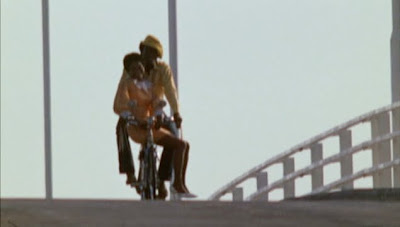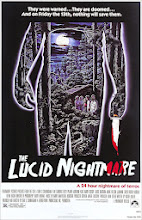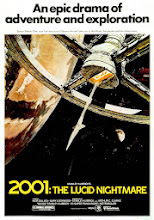Director: Perry Henzell
Year 1972
The Harder They Come is an impressive and intimate film about a young Jamaican man named Ivan Martin, played by an outstanding Jimmy Cliff, who decides to move out of the country and into the city. He arrives in the big city of Kingston with dreams of making a name for himself in the bustling reggae music scene, but comes to find that life can quickly spin out of control and fame definitely has a price. This movie is one of Jamaica's most accomplished films and it really gives us an inside look into the poverty stricken life that Ivan struggles with on a daily basis. That's one of the most appealing aspects of this film. I love the raw nature of the piece as it revels in all its gritty detail and dire consequences.
Ivan day dreams of being a reggae star.
After coming to the realization that it isn't so easy to get your foot in the door in the music industry, Ivan is forced to deal drugs to make ends meet and he begins to get involved with a not so kind hearted group of friends. This effect that the darker side of society seems to have on Ivan, starts to fester as the film moves along and his once innocent persona begins to be tarnished by the corruption of the poverty filled society and the idea of doing whatever it takes to survive and make a name for himself. The struggles that Ivan endures throughout the film is a testament to the realism that director Perry Henzell brings to this story. Everything on screen seems believable and you don't question if this is indeed how Jamaican society had worked during the 70's. The narrative just seems to suck you right in and you accept the rules and details that are thrown at you.
Domino mother fucka!
Jimmy Cliff does an amazing job with his character of Ivan and you can really feel the longing that he has in wanting to be a musician and get his record played on the air. Cliff plays Ivan with a soft and curious exterior in the beginnings of the film, but as his character is tested and his moral fibers brought to the brink, we are given a deeper view into what makes Ivan tick and we're shown a man that is instinctively reacting to the constant threat of his dreams being destroyed. He's a sympathetic character, even if he later proves to have some darker tendencies and violent inclinations, because at the heart of his beliefs he just wants to get his message across and place his name in history through the act of music. His intentions are so genuine and pure at the beginning of this film, that we forgive his many faults and understand that he is living in a hard world that is very unforgiving, even on the innocent souls that inhabit it.
Ivan finds the perfect accessory for his Rock Band party.
The locations and overall look of the film is absolutely outstanding. Some may think the gritty and washed out look of the film is amateurish and possibly pedestrian, but I think it adds to the charm of the film and helps us to be transported to this lifestyle that not many people are accustomed too. Like many films from the 70's, I'm really drawn to the washed out colors and abundance of warm hues that come from this era of filmmaking. With these kind of films, the believability of the tonal elements help bring the realism of the narrative to life and blows absolutely anything that has been recently filmed out of the water when it comes to replicating the feeling of real life.
The glossy look of the new films tend to bend towards the CGI aspects of filmmaking and to my eye, this is far from replicating life, so I've always felt that the 70's era of cinema always seemed like the most true representation of the gritty and imperfect world that we live in. This time period just produces films that are so substantial and steeped in realism. The Harder They Come makes good use of their locations and budget, by filming right in the heart of where their story is taking place. We have no sound stages or hollywood film lots, just the living breathing thing and nothing can be better then that.
Could you please pull over. My ass is killing me.
The violence that is portrayed on the screen is quite visceral and is thrown in your face, not for shock value or exploitive purposes, but to get the point across that this world that Ivan inhabits, tends to be quite violent and dangerous. The film shows that the danger is not necessarily in the threat of ones life, but the inclination that a person has to be drawn into a moral descent where their beliefs are being corrupted at the sake of their survival. We watch as Ivan becomes more and more like the people he hangs around with and the situations that he gets involved with are all the result of the company he keeps. His pivotal stabbing of a man shows this horrible descent in vivid detail and this one act helps propel his character into a realm that he never believed he'd be in both with fame and infamy.
I'll cut you man! I'll cut you!
The soundtrack to this film is phenomenal and if you're at all into reggae, you will be in heaven. Jimmy Cliff lends his expressive vocals to many of the tracks and we're also given some great songs by various reggae artisans. The music in this film, really paints a clear picture for the movie and sets it in its own setting and place in time. The tone and atmosphere are changed by the rhythmic beats and it truly sets the story apart from anything outside of the Jamaican culture. The music is so steeped in tradition and the native culture, that it helps with gauging the audience in the life of Ivan and helping us believe that he is a real person with a family and history like anyone else outside of the celluloid frame. Overall the music transports us to a place that feels tangible and gives an enormous amount of credibility to the narrative, setting up a world that thrives in abounding authenticity.
The hills are alive, with the sound of reggae.
The Harder They Come also deals with the corruption that lies within the music industry in this region and place in time. The record company that allows Ivan to have a recording session, begins exploiting him for money and then later exploiting his infamous status as a cop killer and political hero. No publicity is bad publicity, is a perfect line for Ivan's situation, because the more crimes that he commits and the more his name is being thrown around in separate circles, the more his legend begins to grow until it begins to spin wildly out of control, allowing people to begin making their own depictions of his character and morality. It's interesting how the assumptions of others can change how the world views us and our actions, even if they were done out of pure survival and innocent intent. This film balances some pretty heavy concepts and pulls it off rather nicely while letting us follow the complicated life of Ivan Martin.
Ivan is one cool mother. Shut your mouth! I'm just talking about Ivan.
The metamorphosis of Ivan's character is very interesting to see unfold. He starts out as a quiet and almost timid country boy and then proceeds to change into a more outspoken and cocky individual as his record career begins to ignite. His appearance even changes as he ditches his old threads for a new and more flashy look, leaving his old life behind and embracing the new and robust lifestyle of a musician. This film can even be pegged as a coming of age tale for Ivan. He begins to mimic the artists that he idolized as a young and impressionable youth, taking on a larger then life persona. This same mimicry, is reflected in the closing moments of this film, when Ivan comes out with two guns in hand in a standoff against the police, like a scene that he saw earlier in the film at a movie theater where a gunslinging hero takes on an army of bad guys. I almost feel that by the end of the film, Ivan had lost all sense of reality and was living in some kind of fantasy world where in his mind he was practically invincible. It's interesting to think about and whether it's true or not, you can't deny that the filmmakers have done a wonderful job in making a film that can be taken in so many different ways.
Your beard is enchanting.
The beliefs and morals of Ivan's character are worn on his sleeve and embedded in his lyrics. He sings them with pride and gives such a charismatic edge to his potent words, that it's unsurprising that the community in this film take his lyrics to heart and find strength within them. Even when he accidently murders a cop while defending himself, the community rallies behind him. Not everyone is on his side though and people that he affiliated himself with in the early parts of the story decide on turning him over to the cops, in fear of repercussions from the powers that be. One man in particular that Ivan thought was his friend, betrayed him and this cowardice act effects Ivan in so many ways, and makes him into the person that he is by the end of the film. Ivan says in his hit song, "I'd rather be a free man in my grave than living as a puppet or a slave". With this statement, he makes it his mission in life to pay back the man that manipulated him and eventually sold him to the cops. It's a nice small dosage of a revenge film thrown into the mix and it plays off nicely, giving Ivan an injection of strength and pride throughout the community and thereby solidifying his supporters beliefs that he is truly a political hero.
Good, Bad.. I'm the guy with the gun.
As Ivan's infamous status begins to rise, the film shifts gears into almost gangster type territory, shadowing movies like Goodfellas, Casino, and even Scarface, where the main hero of the story isn't exactly a good guy but we root for them anyway. There's some valid points in comparing The Harder They Come with Al Pacino's classic film Scarface, because both Tony Montana and Ivan Martin come from poor backgrounds and then after involving themselves in the drug trade, they become infamous men. There's also a certain style that both films share that are only separated by the cultures that each film inhabit. Both are visceral films that thrive on the charisma of their main character and rely on the gritty content of the story to pass off as believable to the audience.
Ivan is styling and profiling.
Jimmy Cliff's portrayal of Ivan's descent into the crime world is played with stark realism and respectful affirmation to his characters validity. Never does he stray into campy trappings or over cliched stereotypes. He always presents Ivan as a grounded person who is dealing with the situations that are being thrown at him in a natural and believable way. In keeping the story centralized on Ivan's character, the director was able to allow Jimmy to focus in on what drives Ivan and also allowed him to flesh out the man behind the legendary status. Ivan's tale is larger then life, but we never feel like his character has outgrown the trappings of his environment or that he has unexpectedly fallen into a parody of his former self. The straightforwardness of Jimmy Cliff's performance is without question, one of the high points of this film and in my opinion, one of its many saving graces.
It's Ivan's yearbook picture. It was a tough school.
Like all good antiheroes who try to reach for the stars only to go too far, Ivan becomes his own enemy throwing caution to the wind and challenging the world to take him on. His larger then life ego has sent him on a journey that he cannot come back from and the only way out is in a blaze of glory. The climax is rather sudden in this film and you'll be kind of shocked that it ends on such an abrupt moment, but I think it works perfectly for the kind of story that was being told. We've followed with Ivan's character almost exclusively and it seems perfectly fit to cut to black after Ivan's story comes to a close. We need no explanation on what else happened or how everyone else's lives are wrapped up in the world. The only thing that matters is how Ivan's infamous journey ended and I think it concluded on a satisfactory note resembling the realism that proceeded up until that final point. It's a special tale and I wouldn't change a thing.
Quiet. Ivan is hunting Jamaican pigs.
The Harder They Come is a film that is in a class of its own. It has many elements from various movies, but what holds it all together and gives it a voice of its own is the amazing portrayal of Jimmy Cliff's Ivan and the miraculous soundtrack. Cliff's vocals resonate a sound of victory and hope, one that unfortunately for his character was never able to obtain for his life got caught up in the darker counterparts of society. The cautionary tale of obtaining fame and the consequences that come with it are seen and heard loud and clear and the filmmakers created quite a spectacle that still hasn't been topped in its native country. This classic film is a beacon to those who have a dream and have the desire and fortitude to follow through with it, even if it doesn't end up in the way that you'd hoped, at least you can say that, "I'd rather be a free man in my grave than living as a puppet or a slave." No truer words have been said to better summarize the essence of Ivan Martin's story of his quick rise and inevitable fall from grace. This is a must for any cinema fan.
4 out of 5 stars Jamaica's Character Driven Masterpiece!
















































































































































